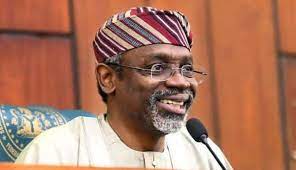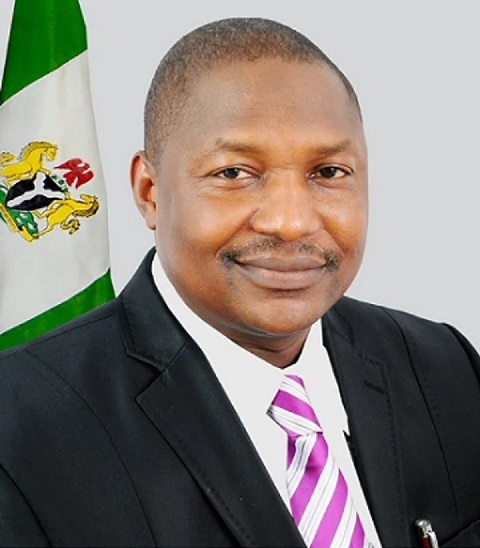COVER
Gbajabiamila Blasts Senate for Rejecting Students Loan Bill

By Ubong Ukpong, Abuja and Yagana Ali, Yola
House of Representatives Speaker, Rep Femi Gbajabiamila, yesterday came hard on the Senate for not concurring to a bill on students loan he sent to the upper legislative chamber since 2019, but expressed hope that it would be signed into law before the end of this administration.
Gbajabiamila, who lamented over what he described as the failed tertiary education system in the country, said he was shopping for ideas and policies to revive the sector.
In an address at the national summit on tertiary education reform 2022, organized by the House of Representatives in Abuja, Gbajabiamila also canvassed equal opportunities for all Nigerians to compete favourably in the country, by operating a tertiary education system that would help everyone to rise in life.
The Speaker, who said he was exploring ways to enable Nigerian students raise funds to finance their studies in the higher institutions,
“More than at any other time in our history, we are called to speak truthfully to one another about the challenges we face and the hard choices necessary to overcome. Allow me this morning to speak the truth as I see it so that together we can agree on what we need to do to overcome.
“Time was when the tertiary institutions in our country were centres of excellence, comparable to the best institutions elsewhere in the world. There was a time when our brothers and sisters from across Africa and even farther away sought out our institutions, and we welcomed them in droves. That time is no more.
“It used to be that a student admitted to the university knew the date of their graduation and graduated on that day. And it once was that a career in academia guaranteed stable employment and an honourable quality of life. For the most part, all of these now exist as memories of a distant past. But it really wasn’t so long ago.
“I do not speak of these things to mourn the past or dwell in the memory of what was. I speak from a place of hope that by reminding ourselves of what was, we might be inspired to embrace the possibility of all that could be if we make the right choices now.
“For eight months this year, students of federal tertiary institutions sat at home due to a litany of unresolved issues between the Academic Staff Union of Universities (ASUU) and the Federal Government of Nigeria. These university strikes are almost perennial and preceded this government. The recent one was not the first and may not be the last unless we determine to make it so.
“The end of the strike was a relief to all; it meant the resumption of academic activities and a return to routine for students. However, the end of the strike did not mean all the issues of funding, education standard, and student and staff welfare had been resolved. At the time, I called for the government, universities, unions, and citizens to see the moment as an opportunity to begin the critical conversation about the future of public tertiary education in the country.
“This National Summit on Tertiary Education Reform (NSTER) is the manifestation of our commitment in the 9th House of Representatives to engender a national conversation to consider bold ideas and radical innovations to restructure and reform public tertiary education in Nigeria.
“How do we ensure that every child born in Nigeria in this generation and hereafter can compete favourably in an ever-changing world? This is the defining issue of our age. And the answer is simple, we do it by providing a quality education that empowers the mind to ask hard questions and accept complicated solutions. We do it by training our people to revel in the inquiry, embrace complexity and not be afraid of knotty problems,” the Speaker stated.
He reminded that education was the silver bullet that eliminates poverty and lack; stressing that it also presents hope and confidence and reduces violence and strife.
“Education offers us the promise that by the application of our minds and the works of our hands, we can make this world better and improve the life of man on this earth. Education is the gift that keeps on giving through generations.
“A university degree, or tertiary qualification of some other kind, can be the catalyst that changes the trajectory of an entire family. Evidence abounds of the transformations that can happen when ambition and diligence are amplified by access to quality education and training.
“By all means, in a perfect world, access to education will be a fundamental benefit afforded to every individual from basic through tertiary. And our learning centres will be majestic citadels of research and innovation, open to all who seek knowledge, regardless of means. But this is not a perfect world. In this real world, education is a commodity and a quality education even more so.
“Therefore, the central public policy challenge is the conflict between the competing objectives of access and quality. How do we fund a quality tertiary education without imposing costs that make access to quality education impossible for most people?
I don’t have the answer to that question. I have my own ideas, and I have, as a legislator, sought to advance those ideas through the legislative policy process.
“In 2019, I sponsored, and the House of Representatives passed the Students Loan (Access to Higher Education) Bill to provide access to education financing for students who qualify. That Bill is in the Senate, awaiting concurrence. We hope it will get to the President before the expiration of this administration. But a framework of student loans is only one idea. I believe there are many more,” Gbajabiamila stated.
He said the summit aimed to provide an opportunity for all Nigerians and friends of Nigeria to present those ideas for consideration, examination, debate and, eventually, action.
COVER
DAILY ASSET Appoints Torough, Editor, Names Eze, Deputy

By Laide Akinboade, Abuja
As part of efforts to reposition the newspaper for optimum corporate performance, the management of Asset Newspapers Limited, Publishers of DAILY ASSET, has announced the appointment of David Torough as the Editor of the Abuja-based national daily.
A statement by the management said the appointments were part of the company’s new strategy to further penetrate the various states in the country and raise its readership and patronage.
“DAILY ASSET is widely acceptable across the country and to maintain our leadership position, we need to increase management presence, hence the need to create new Bureau offices in some locations outside Abuja and Lagos,” the statement quoted the Publisher/ Editor-in-Chief, Dr Cletus Akwaya to have said.
In a statement yesterday, Publisher and Editor-in-Chief of the fast-growing daily, Dr. Cletus Akwaya said the appointment was part of the new strategy to properly situate the paper for better productivity.
“DAILY ASSET has a commitment with the Nigerian people. We are determined to weather the storm and give Nigerian readers a Newspaper that satisfies their yearnings and reading pleasure and we can only do that with the right set of professionals,” the statement said.
Akwaya, a former Commissioner of Information from Benue State said the difficult times being faced by Nigerians posed a great challenge to the media as the people deserved credible information with which to make choices.
“We have a bond with the people, to offer credible information at all times in the best tradition of the Nigerian Press and on this scale of objectivity, truth and fairness, we pledge to remain steadfast no matter the challenges,” Akwaya was quoted to have said.
He said the newspaper will maiantin its daily print run and circulation to all states of the federation and urged advertisers to take advantage of the deep penetration of the Daily Asset brand to send their messages.
Torough, the new Editor has had a steady rise in the Newspaper in the last five years.
A graduate of Mass communication of the Benue State University, Makurdi, Torough joined the company in 2022 as Benue State Correspondent. He was spotted for his brilliance and redeployed to Abuja the following year and promoted to Deputy News Editor. He was subswuently named Deputy Editor of the paper, a position he held until the recent appointment.
Torough has attended several journalistic workshops and trainings to properly equip himself for the task ahead.
The statement also said the Management named Eze Okechukwu as Deputy Editor.
Before his elevation as Deputy Editor, Eze has been Deputy Politics Editor and DAILY ASSET Newspaper correspondent covering the Senate, having joined the organization in 2021.
Born on March 10, 1975, Eze holds a Masters Degree in Mass Communication from the Enugu State University of Science and Technology.
Eze began his journalism career with Daily Star, Enugu and later worked with Daily Trust Newspaper, Abuja as sports reporter.
Aside from his journalistic excellence, he has a great deal of passion for sports.
COVER
Insecurity: Northern Govs, Monarchs Seek Six-month Mining Suspension

From Ngutor Dekera, Kaduna and Aliyu Askira, Kano
Northern governors and traditional rulers yesterday called for the suspension of mining activities across the region for six months, blaming illegal mining for worsening insecurity in many states.The resolution was contained in a communiqué issued after a joint meeting of the Northern States Governors’ Forum and the Northern Traditional Rulers’ Council held at the Sir Kashim Ibrahim House, Kaduna.
The meeting, chaired by the Gombe State Governor and NSGF Chairman, Muhammadu Yahaya, had in attendance the 19 northern governors and chairmen of the 19 states’ traditional councils. The Forum expressed concern over the escalating violence in parts of the North, including the killings and abductions recently recorded in Kebbi, Kwara, Kogi, Niger, Sokoto, Jigawa and Kano states, as well as renewed Boko Haram attacks in Borno and Yobe.“The Forum extends its deepest condolences and solidarity to the governments and good people of the affected states,” the communiqué said, noting that the attacks on schoolchildren and other citizens had become “unacceptable tragedies” that required urgent collective action.It commended President Bola Tinubu for what it described as the Federal Government’s “firm response” to recent abductions and insurgency threats, especially the rescue of some abducted pupils.The governors also saluted security agencies for their sacrifices on the frontlines.“We resolved to renew our support for every step taken by the President and Commander-in-Chief to take the fight to insurgents’ enclaves in order to end the criminality,” the Forum stated.A major highlight of the meeting was the North’s renewed push for the establishment of state police, with governors and traditional rulers insisting that decentralised policing had become inevitable.“The Forum reaffirms its wholehearted support and commitment to the establishment of state police,” the communiqué added, urging federal and state lawmakers from the region to “expedite action for its actualisation.”On illegal mining, the governors said criminal mining networks were fuelling violence and providing resources for armed groups.As a corrective measure, they asked Tinubu to direct the Minister of Solid Minerals to impose a six-month suspension of mining activities in order to allow for a full audit and revalidation of licences.“The Forum observed that illegal mining has become a major contributory factor to the security crises in Northern Nigeria. “We strongly recommend a suspension of mining exploration for six months to allow proper audit and to arrest the menace of artisanal illegal mining,” it said.To strengthen the fight against insecurity, the governors also announced the creation of a regional Security Trust Fund.Under the proposed arrangement, each state and its local governments will contribute ₦1bn monthly, to be deducted at source under an agreed framework.They said the fund would help provide sustainable financing for joint operations, intelligence-driven interventions and coordinated security responses across the region.At the end of the meeting, the Forum reaffirmed its commitment to unity and collective responsibility.“Only through unity, peer review and cooperation can we overcome the pressing challenges before us,” it declared.The Forum agreed to reconvene on a date to be announced.Meanwhile, Nigeria’s worsening security crisis took a grim turn on Monday as bandits launched fresh attacks in Kano State, abducting 25 villagers, even as the Federal Government raced to secure the release of more than 300 Catholic school children kidnapped in Niger State.In the early hours of Monday, armed bandits invaded Unguwar Tsamiya—popularly called Dabawa—in Shanono Local Government Area of Kano State, whisking away nine men and two women after shooting into the air and assaulting residents. The attackers also rustled two cows.A resident lamented the community’s helplessness: “We cannot do otherwise; most of us cannot leave because we have nowhere to go. This is our place, our land and everything is here.”The assault came less than 24 hours after a similar attack on Yan Kamaye in Tsanyawa LGA, a community along the volatile Katsina border.In Niger State, National Security Adviser Nuhu Ribadu has assured distraught families of St. Mary’s Co-Education School, Kontagora that the more than 300 students and staff abducted on November 21 will return home “soon.” Ribadu, who led a high-level federal delegation to the school on Monday, said the abductees are safe, though he offered no specifics on their location or the status of rescue operations.According to Daniel Atori, spokesman for the Catholic bishop overseeing the school, the NSA reassured officials: “The children are where they are and will come back safely.”The St. Mary’s attack is part of a worrying resurgence of mass kidnappings reminiscent of the 2014 Chibok schoolgirls’ abduction. Security analysts warn that banditry has evolved into a “structured, profit-seeking industry,” with hundreds of Nigerians abducted in November alone.The Kontagora school abduction occurred the same week 25 girls were kidnapped in Kebbi State—victims who authorities say have since been rescued through “non-kinetic” means. About 50 of the St. Mary’s hostages have also managed to escape.Ribadu’s delegation, which included the Minister of Humanitarian Affairs and the Director-General of the Department of State Services (DSS), reaffirmed the government’s commitment to securing the freedom of all abducted citizens.As communities from Kano to Niger continue to bear the brunt of these violent incursions, the escalating spate of kidnappings underscores the urgent national demand for a more decisive and coordinated security response.COVER
Abacha Loot Probe: Malami Faces EFCC Panel Daily in December

By David Torough, Abuja
The Economic and Financial Crimes Commission (EFCC) said former Attorney‑General of the Federation and Minister of Justice, Abubakar Malami, will face a team of interrogators at its office daily throughout December.A credible source in the EFCC said on Monday that the daily appearance was part of an ongoing investigation into the whereabouts of an alleged 490 million dollars Abacha loot secured through a Mutual Legal Assistance (MLAT) request.
The source said that Malami, who was summoned for interrogation by the EFCC on Saturday, was barred from leaving Nigeria for the next one month.According to the source, one of the conditions for his release on Saturday was that he should report daily to the EFCC Headquarters in Abuja for further interrogation.The source said Malami would have to appear daily at the anti-graft office due to the volume of the investigation and the seriousness of the charges against him.”We seized his passport, it is the normal routine during investigation, but he has to report at the EFCC headquarters in Abuja every day for the next month.”He will be reporting for further investigation throughout December.”He will be reporting every day, starting from Dec. 1st to Dec. 31st.He will appear before the team of investigators for the entire month of December.”He will be reporting to EFCC for investigation for the period because of the volume of the investigation and the seriousness of the charges against him,” the source added.According to the source, a fact sheet on the former minister revealed that Malami had several issues to clarify with the EFCC within the coming weeks.“We have asked him to explain the whereabouts of the $490 million Abacha loot secured through MLAT.“We didn’t say he stole money, but he should account for the loot. This is one of the issues he will clarify to our investigators.”The commission cited the large volume of documents he must review and the need for extensive interviews as reasons for seizing his passport.The source said EFCC would not engage in a war of words but would release its findings after a thorough investigation.Malami, in a statement by his media aide, Mohammed Doka, on Monday in Abuja, however, described the EFCC investigation as a political witch‑hunt.He confirmed he honored an EFCC invitation on Nov. 28, describing the engagement as fruitful and expressing confidence that the probe would vindicate him.Malami described the EFCC’s allegations as baseless, illogical and devoid of substance, insisting they collapse under factual scrutiny.





















